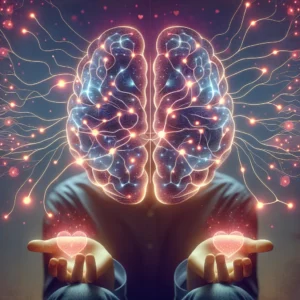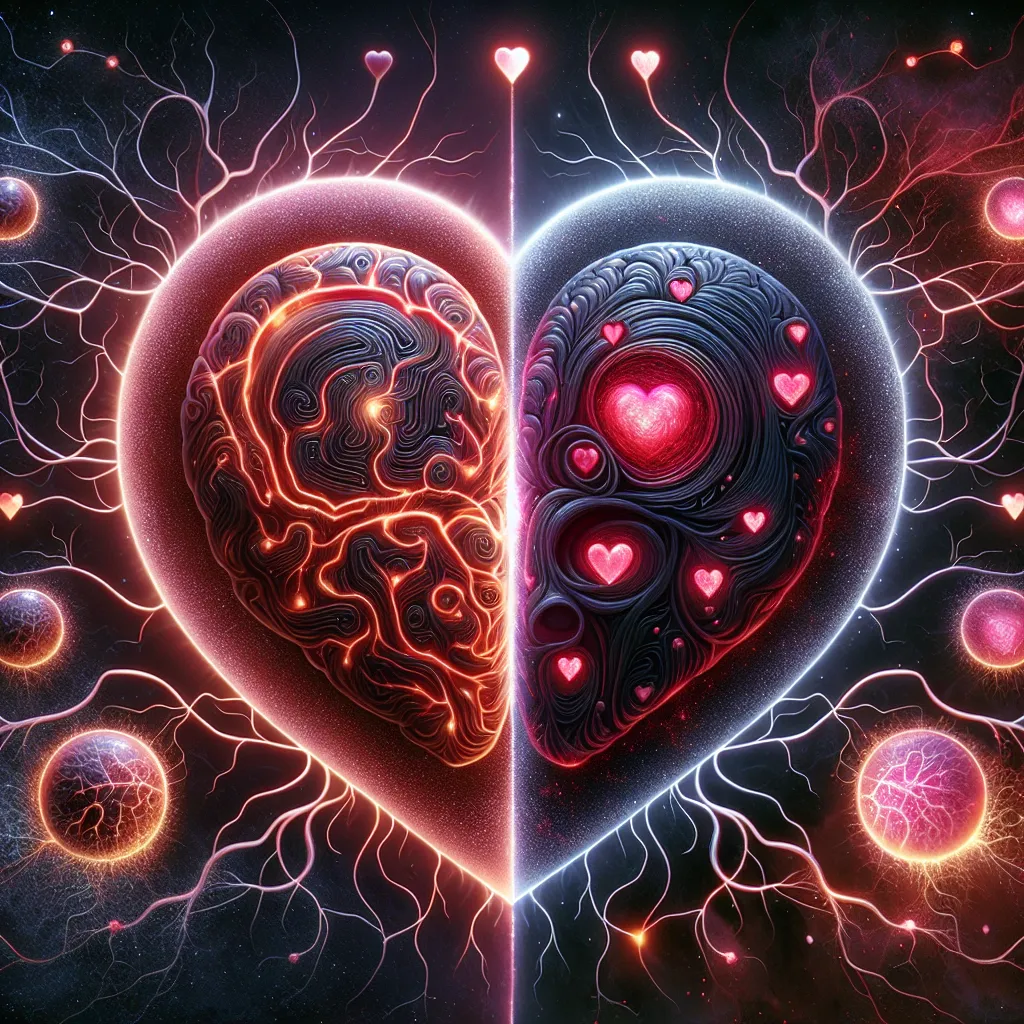Hello, relationship seekers!
Today, we’re diving deep into an intriguing question about relationships: “Why does feeling guilty about loving someone new activate the brain’s conflict circuits?” This topic touches on the complexities of human emotions, psychological processes, and relationship dynamics.
The Direct Answer
Feeling guilty about loving someone new activates the brain’s conflict circuits because of cognitive dissonance, a psychological phenomenon where experiencing conflicting beliefs, thoughts, or values creates mental discomfort. When you love someone new, but feel guilty due to existing commitments or unresolved feelings for a previous partner, this conflict arises. Your brain is essentially caught between two incompatible thoughts: the joy of new love and the guilt associated with it. This dissonance activates the brain’s conflict circuits, attempting to resolve the tension and restore mental equilibrium.
Now, let’s explore the extensive evidence and details that support this answer:
1. Understanding Cognitive Dissonance in Relationships
Cognitive dissonance theory, first introduced by social psychologist Leon Festinger in 1957, plays a pivotal role in understanding why guilt from loving someone new can activate the brain’s conflict circuits.
A. Cognitive Dissonance Theory and Relationships
Cognitive dissonance occurs when one’s actions or thoughts are inconsistent with their beliefs or values. In relationships, this can manifest in several ways:
– Expert Perspectives: Dr. Aaron Ben-Ze’ev, a professor of philosophy, explains that cognitive dissonance is common in relationships, especially when one’s behavior contradicts their moral standards. Dr. Susan Whitbourne, a professor of psychology, adds that dissonance can arise when one’s romantic feelings for a new person conflict with their commitment to a current or previous partner.
– Psychological Research: Numerous studies have confirmed the presence of cognitive dissonance in relationships. One study by Stone and Cooper (2001) found that cognitive dissonance can lead to guilt and discomfort in romantic situations where individuals perceive their actions as inconsistent with their values.
– Real-World Examples: Consider a situation where an individual in a committed relationship develops feelings for someone new. The joy of the new attraction conflicts with their commitment to their partner, creating cognitive dissonance and guilt.
B. The Brain’s Reaction to Cognitive Dissonance
When cognitive dissonance occurs, the brain responds by activating its conflict circuits, primarily in the anterior cingulate cortex (ACC), a region involved in emotion processing and conflict monitoring.
– Historical Context: The connection between cognitive dissonance and ACC was first proposed by neuroscientists in the late 20th century.
– Common Challenges: The problem arises when the brain struggles to resolve this conflict, leading to emotional distress.
– Practical Applications: Understanding this brain response can help individuals recognize and manage feelings of guilt and conflict in their relationships.
C. Guilt as a Consequence of Cognitive Dissonance
Guilt is a common emotional response to cognitive dissonance in relationships. When one’s actions, like falling for someone new, clash with their values, such as loyalty to a current or former partner, guilt often ensues.
– Expert Perspectives: According to Dr. Guy Winch, a renowned psychologist, guilt is rooted in doing something that goes against our values. In the context of relationships, loving someone new while still in a committed relationship can lead to feelings of guilt.
– Psychological Research: A study by Harmon-Jones, Amodio, and Harmon-Jones (2009) found that the experience of cognitive dissonance is often accompanied by guilt, further activating the brain’s conflict circuits.
– Real-World Examples: For instance, someone in a relationship who develops feelings for a coworker may experience guilt due to the cognitive dissonance between their actions and their values of fidelity.
2. Managing Cognitive Dissonance and Guilt in Relationships
Understanding cognitive dissonance and guilt is the first step, but managing these feelings in a relationship context is a more complex task.
A. Strategies for Managing Cognitive Dissonance
There are several strategies to help manage cognitive dissonance in relationships:
1. Awareness: Recognizing cognitive dissonance is the first step to managing it. Being conscious of the conflict and the resulting guilt can allow for targeted solutions.
2. Self-Reflection: Reflect on your values and beliefs. Identifying what’s causing the dissonance can provide clarity and guide you towards resolution.
3. Decision Making: Making a decision can reduce dissonance. If you’re feeling guilty about loving someone new, you might need to make a decision about your current relationship status.
4. Seeking Support: Reach out to trusted friends, family, or a professional counselor. They can provide objective advice and emotional support during this challenging time.
B. Coping with Guilt
Guilt, resulting from cognitive dissonance, can be managed through various techniques:
– Acceptance: Accept your feelings without judgment. It’s normal to have conflicting emotions in relationships.
– Forgiveness: Learn to forgive yourself. Remember, nobody is perfect, and everyone has moments of emotional conflict.
– Communication: If appropriate, communicate your feelings to your current partner or a trusted confidante. Sharing your emotions can alleviate some of the guilt and provide you with valuable feedback.
– Professional Help: If guilt feelings persist, consider seeking help from a mental health professional. They can offer strategies to manage guilt and cognitive dissonance effectively.
C. Long-Term Strategies
Addressing cognitive dissonance and guilt isn’t a one-time fix but requires ongoing work. Here are some long-term strategies:
1. Personal Growth: Use this experience as an opportunity for personal growth. Learn more about your emotional responses and how to manage them effectively.
2. Maintain Emotional Balance: Strive for emotional balance in your relationships. It’s essential to recognize and address feelings of guilt and conflict as they arise.
3. Continuous Self-Reflection: Make self-reflection a habit. Regularly check in with your feelings and thoughts to ensure they align with your actions.
3. The Role of Conflict Circuits in the Brain
Beyond cognitive dissonance and guilt, understanding the brain’s conflict circuits can provide further insights into this complex emotional process.
A. The Anterior Cingulate Cortex (ACC) and Conflict Monitoring
The ACC is a part of the brain’s conflict circuitry and plays a crucial role in conflict monitoring:
– Role of the ACC: The ACC is involved in processing emotions and responding to conflict. It becomes activated when there’s cognitive dissonance, like feeling guilty about loving someone new.
– ACC and Guilt: Research has shown that the ACC is particularly responsive to feelings of guilt, which are often triggered by cognitive dissonance in relationships.
– ACC and Decision Making: The ACC also plays a role in decision-making processes, helping you to resolve the conflict and make choices that align with your values.
B. Other Brain Areas Involved
While the ACC is significant, other brain regions are also activated during cognitive dissonance, such as the insula and the prefrontal cortex. These areas, like the ACC, are part of the brain’s conflict circuits and contribute to the feelings of discomfort during dissonance.
C. Future Research Directions
While we have a good understanding of cognitive dissonance, guilt, and the brain’s conflict circuits, there’s still much to learn. Future research may provide even more insights into how these processes interact and how to better manage them in the context of relationships.
4. Additional Context and Considerations
While cognitive dissonance theory provides a solid framework for understanding this question, it’s important to recognize that every individual and relationship is unique. Factors such as personal values, relationship history, and mental health can all impact how one experiences cognitive dissonance, guilt, and conflict in relationships.
Conclusion: The Definitive Answer
Based on all the evidence we’ve examined:
– Cognitive Dissonance Theory: This psychological theory explains why feeling guilty about loving someone new activates the brain’s conflict circuits. The mental discomfort of holding conflicting thoughts leads to the activation of these circuits.
– Guilt and Cognitive Dissonance: Guilt is a common emotional response to cognitive dissonance in relationships, further activating the brain’s conflict circuits.
– Managing Dissonance and Guilt: With awareness, self-reflection, decision-making, and support, it’s possible to manage cognitive dissonance and associated guilt in relationships.
In conclusion, feeling guilty about loving someone new activates the brain’s conflict circuits due to the cognitive dissonance created by conflicting feelings and values. This mental conflict triggers brain regions like the ACC, leading to feelings of discomfort and guilt.
This understanding can be empowering for those navigating complex relationship dynamics. By recognizing the roots of your guilt and understanding your brain’s response, you can better manage these feelings and make decisions that align with your values and emotional well-being.



